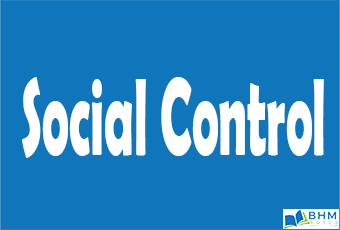
Social Control
In general, social control is the control of society over the individual. Rousseau’s Book ‘Social Contract ‘ Mentioned a famous sentence,” Man is born free and everywhere he is in chains. It is true that man cannot be absolutely free in society. Attainment of individual happiness is the main aim of social life. Happiness can be attained not with unbounded freedom for action but with restricted behavior. Thus, Man has given the power of exercising control over his behavior.
Social Control refers to the control of society over the individual. The survival and smooth functioning of society are possible only when there is:
- Social harmony (living together peacefully rather than fighting),
- Social solidarity(support)and
- Social Order
It is possible only when members of society follow certain rules and norms that existed in society.
Definitions of Social Control:
- EA Ross- Social control refers to the system of devices whereby society brings its members into conformity with the accepted standards of behavior.”
- GA Lundberg and others, “ Those behaviors which influence individuals or groups toward conformity to established or desired norms”.
- Manheim, ”Social Control is the Sum of those methods by which a society tries to influence human behavior to maintain a given order.”
Types of Social Control:
Formal Control:
- The state makes use of Law, Legislation, Military force, administrative devices, etc for the purpose of social control. It is practiced more in a large society.
- Different political, religious, economic, cultural, and other associations and institutions and institutions also institute formal control over the behavior of members.
Informal Social Control:
- It includes gossip, Slander, public opinion, sympathy, a sense of Justice, Folkways, mores, customs, religion, morality, etc.
- It is more effective in primary groups such as Family, neighborhood, Tribe, Rural community where interaction takes place on a personal basis.
- They arise in their own way (not created purposefully)and in course of time gain popularity.
Agencies of Social Control:
- Control by Law
- Control by Education
- Control by Coercion
- Control by Custom
- Control By Religion
- Control By Norms/Values/beliefs
Control by law:
- Early societies depend upon informal means of social control but when societies grew in size and complexity it was the compulsion to formulate rules and regulations called law.
- Law is enforced by authorized agencies which clearly define Rights, Duties, and Punishment of violation.
- In modern society, a relationship is secondary in Nature. Informal means of Social Control are no longer sufficient to maintain social order and harmony in this complex society.
- Thus the law is created, Law is the most powerful formal means of Social Control in modern society.
- It appears in societies with political organizations, that is government. (Laws are made by the elected legislators in the Assembly)
- JS. Roucek-” Laws are a form of social rule emanating (Get Strong Quality) from political agencies”.
Control by Education:
- Education is the social heritage of the group which is passed on from generation to generation.
- It is the process of socialization that prepares the child for social living. It helps to reform the negative belief and attitudes.
- It is not just concerned with transmitting a way of life but it is largely devoted to the communication of empirical(Practical)knowledge.
- Education teaches us Discipline, Social Cooperation. Tolerance and sacrifice, Qualities of honesty, sense of right and wrong.
- It is very much necessary for the changing of the world rather than Static.
Control by Coercion
- It is the use of force to achieve the desired end. It is the ultimate means of social control when all other means fail.
- It may be:
- Physical Coercion (may take the form of bodily injury, imprisonment, and Death Penalty) Or it is the lowest form of Social Control.
- Non-violent Coercion consists of the strike, boycott, and non-cooperation. Society would least desire to use it.
Control by Customs:
- It is a Kind of Informal Social Control.
- MacIver and Page-Many of our daily activities are regulated by customs(our way of dressing, speaking, eating, working, worshiping, celebrating festivals, etc) are controlled by Customs.
- These are self-accepted rules of life. All the people within society prefer to live according to their specific social rules and norms.
Control by Religion:
- Religion refers to man’s faith or belief in some Supernatural power or force.
- Maciver, ”Religion implies a relationship not merely between man and man but also between man and some higher powers”.
- The concept of Spirits, Ghosts, taboos, Souls, and Divine powers Control human actions and enforce Discipline.
- Ideas of Hell and Heaven have great effects on the behavior of people.
Social Values (moral, social, spiritual) are strongly supported by religion. - Men are always afraid of going against the divine will /power. (tries to get the blessing from Divine power)
- Sometimes man by surrendering himself to the divine forces tries to suppress his own impulses and selfish desire.
Control by Norms/Values/Beliefs
- Norms are humanly created rules and Guidelines which specify the behavior of an individual. (norms keep the individual within the boundary of society and its culture)
- Value is anything getting importance in our daily life. The origin of Value is not Biological but Social.
- Beliefs- Beliefs are the things a member of a culture holds to be true.
You may also like Social Stratification || Social Stratification || Bcis Notes

Leave a Reply